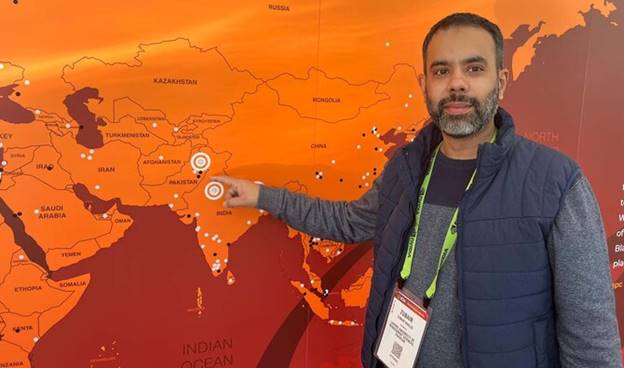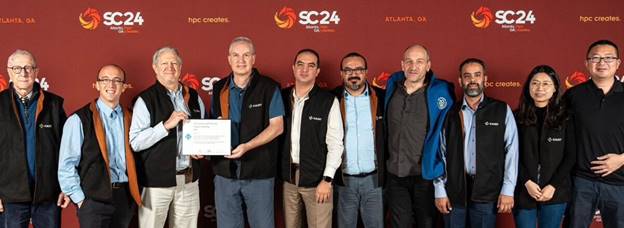
In this photo, released by the Lahore University of Management Sciences on November 27, 2024, Pakistani professor Dr Zubair Khalid gestures during the Association for Computing Machinery (ACM) conference in Atlanta - Photo courtesy LUMS
Pakistani among Researchers to Win Prestigious Gordon Bell Prize for Climate Modelling
By Hasaan Ali Khan
Islamabad: A multi-institutional team of researchers, including a Pakistani academic, has won the Gordon Bell Prize for Climate Modelling by creating an advanced predictive model for climate analysis, a statement from the Lahore University of Management Sciences (LUMS) said.
LUMS Associate Professor Dr Zubair Khalid was part of the 12-member team that won the award, which recognizes innovative parallel computing contributions toward solving the global climate crisis.
The team presented the project, titled, “Boosting Earth System Model Outputs and Saving PetaBytes in Their Storage Using Exascale Climate Emulators,” at the Association for Computing Machinery (ACM) conference that was held in Atlanta earlier this November.
“The university has been instrumental in supporting my contributions to this endeavor by fostering an environment that encourages interdisciplinary research and collaboration,” LUMS said in a statement, quoting Dr Khalid.

Dr Zubair Khalid (3R) with the group of multi-institutional team of researchers during the Association for Computing Machinery (ACM) conference in Atlanta - Photo courtesy LUMS
“Through my Center for Urban Informatics, Technology, and Policy, the university facilitated my engagement with global research networks and positioned me to contribute to high-impact international projects.”
Dean of the Syed Babar Ali School of Science and Engineering at LUMS, Dr Walther Schwarzacher, congratulated Dr Khalid for winning the prestigious award.
“This remarkable achievement highlights the outstanding contributions that the School’s faculty are making to address some of the greatest scientific challenges facing our society,” the statement quoted Schwarzacher as saying.
The Gordon Bell Prize is presented by the Association for Computing Machinery each year in conjunction with the SC Conference series, formerly known as the Supercomputing Conference. The prize was established in 1987. A cash award of $10,000 (since 2011) accompanies the recognition, funded by Gordon Bell, a pioneer in high-performance and parallel computing. – Arab News
Dawn adds: Dr Khalid told Dawn that their project was a ‘smart climate model’ that surpassed traditional climate models that take a “long time to run and produce enormous amounts of data that are difficult to store and analyze”.
“Our emulator acts like a highly intelligent, compact version of these models,” he said, adding that their tool also reduces the energy footprint of climate modeling.
“Instead of running full simulations, it can predict climate patterns accurately and quickly by using smaller data inputs and advanced algorithms.”
The emulator would enable “significant advancements” in how “we understand, predict, and respond to climate-related phenomena both at the local and global scale”.
As extreme weather events become a new normal, traditional climate models often struggle to provide precise, localized predictions due to computational limitations, Dr Khalid said.
“The ExaScale Climate Emulator significantly improves accuracy and speed in forecasting these events, and enabling timely and accurate flood predictions, enhanced forecasts of hurricanes and tropical storms, and precise heatwave predictions,” he added.
It also provides climate data at an exceptionally fine scale (km scale in space and hours in time) that enables localized disaster readiness in small towns and communities overlooked by broader models.
Their tool can be used to help farmers optimize sowing schedules and irrigation strategies based on highly localized weather and climate forecasts.
This emulator would make a “tangible difference in Pakistan” by bringing climate science closer to real-life solutions that protect lives and livelihoods, according to Dr Khalid.
Speaking about his role in the research team, Dr Khalid said his work focused on “integrating spatial data analysis and modeling tools” for faster and accurate emulations.
It is an “incredibly humbling honor” to be the first Pakistani to receive this prestigious award, he told Dawn.
“For me, this recognition is not merely personal, it is a profound honor to represent Pakistan on the global stage and contribute to addressing one of the most pressing global challenges of our time,” he said, hoping the achievement would inspire young scientists in Pakistan to pursue research and innovation, knowing that their work can make a global impact. - Dawn

